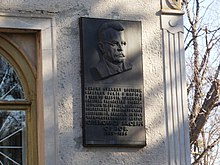Alexander Yakovlevich Orlov
Alexander Yakovlevich Orlov ( Russian Александр Яковлевич Орлов ; born March 23 . Jul / 4. April 1880 greg. In Smolensk ; † 28. January 1954 in Kiev ) was a Russian astronomer and university teachers .
Life
The priest's son Orlov attended grammar school in Voronezh from 1894–1898 . 1898–1902 he studied at the physical - mathematical faculty of the University of St. Petersburg . In 1901 he worked at the Pulkovo Observatory . 1903–1904 he attended lectures at the University of Paris . In 1905 he did internships with Emil Wiechert at the University of Göttingen , with Carl Charlier at the University of Lund and in the astronomical observatory of the University of Dorpat . 1906–1907 he worked again in the Pulkovo Observatory.
1910 defended Orlov at the University of St. Petersburg his Magister - thesis . In the same year he was elected as a member of the Permanent Seismological Commission at the Russian Academy of Sciences . In 1911 the commission sent him to the international seismology congress in Manchester . There he was elected a member of the International Committee for the Study of Earth Deformation . He then visited the Yerkes Observatory in the USA to study comet photography . In 1912 he took part in the expedition from Tobolsk to Bijsk to measure gravity in Siberia on the Irtysh , Ob and Bija rivers . In the same year he organized the construction of a gravimetric station in Tomsk on behalf of the International Seismological Bureau , in which the observation of the lunar attraction with the help of horizontal pendulums began as early as 1913 .
1913-1934 Orlov was a professor at the University of Odessa and director of the University's astronomical observatory . In 1915 he was with his results of the observation of Erddeformation by moon and sun for Doctor of Physical and Mathematical Sciences PhD. From 1926 to 1934 he was also director of the Poltava gravimetric observatory , to the establishment of which he had contributed significantly. In 1927 he became a corresponding member of the Academy of Sciences of the USSR .
In a contribution to a book about life and technology in the future published in 1928, Orlov discussed possible settlements on Mars and the Moon.
1934–1938 Orlov worked at the Sternberg Institute for Astronomy in Moscow . 1938–1951 he was again director of the Poltava gravimetric observatory. In 1939 he became a real member of the Academy of Sciences of the Ukrainian Soviet Socialist Republic . In addition, he was 1944–1949 and 1951–1952 director of the main observatory of the Academy of Sciences of the Ukrainian Soviet Socialist Republic near Kiev, founded on his initiative . He died in Kiev in 1954 and was buried there in the Lukjanivska cemetery .
Orlow made important contributions to theoretical astronomy , seismometry , gravimetry and magnetometry. He developed new methods of gravimetry and created gravimetric maps of the Ukraine , European Russia , Siberia and the Altai and connected them to a network. He examined the momentary movement of the earth's axis and obtained more precise data on the polar movements . He studied the influence of the moon on sea water levels and wind speeds and directions. With his research he is considered one of the founders of geodynamics .
Orlov was married and had 6 children. The physicist Igor Georgievich Neiswestny was a grandson of Orlov.
Orlov is the name of the minor planet (2724) Orlov, discovered by Nikolai Stepanowitsch Tschernych in the Crimean Observatory in 1978, and the lunar crater Orlov on the back of the moon.
Honors, prizes
- Order of the Red Banner of Labor (1944)
- Honored Scientist of the Ukrainian Soviet Socialist Republic (1951)
- Order of Lenin
Individual evidence
- ↑ a b c d Alexander A. Gurshtein : Orlov, Alexander Yakovlevich . In: Biographical Encyclopedia of Astronomers . S. 1628–1629 ( [1] [accessed January 25, 2019]).
- ↑ a b c Волянская М. Ю., Каретников В. Г., Мандель О. Е .: Александр Яковлевич Орлов: научная деятельность (accessed January 25, 2019).
- ↑ Russian Academy of Sciences: Орлов Александр Яковлевич (accessed January 25, 2019).
- ↑ Polina Popova: Zhizn 'i tekhnika budushego: Social Utopian Imagination of the 1920s and the Soviet Science (accessed January 25, 2019).
| personal data | |
|---|---|
| SURNAME | Orlow, Alexander Jakowlewitsch |
| ALTERNATIVE NAMES | Орлов, Александр Яковлевич (Russian) |
| BRIEF DESCRIPTION | Russian astronomer and university professor |
| DATE OF BIRTH | April 4, 1880 |
| PLACE OF BIRTH | Smolensk |
| DATE OF DEATH | January 28, 1954 |
| Place of death | Kiev |

